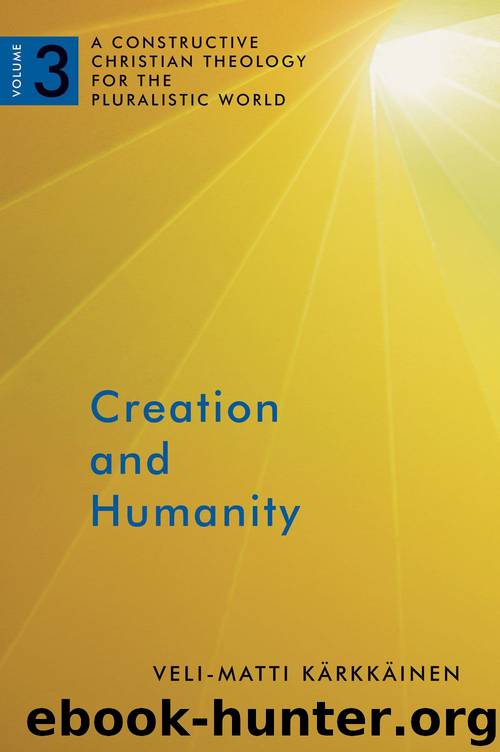Creation and Humanity: 3 by Veli-Matti Karkkainen

Author:Veli-Matti Karkkainen [Karkkainen, Veli-Matti]
Language: ara
Format: azw
Publisher: Wm. B. Eerdmans Publishing Co.
Published: 2015-04-12T16:00:00+00:00
The Dignity of Human Life
Christian tradition routinely located the uniqueness and dignity of human life in the immortal soul. While understandable, that move is hardly supported by the biblical data; what is, however, affirmed in the biblical teaching is the link between the image of God and the inviolability of human life (Gen. 9:6).103 In keeping with the discussion above, the locus of the dignity is the whole human being (and humanity at large) set in relation to God.104
While not uniquely a biblical or Christian idea,105 only the image of God and, as a result, the “destiny of fellowship with God confers inviolability on human life in the person of each individual.”106 Pannenberg correctly concludes: “A feature of the dignity that accrues to us by virtue of our being destined for fellowship with God is that no actual humiliation that might befall us can extinguish it. In a special way, because they have nothing else that commands respect, the faces of the suffering and humbled and deprived are ennobled by the reflection of this dignity that none of us has by merit, that none of us can receive from others, and that no one can take from us.”107
While Christian theology should give full support to human attempts to establish human dignity on “natural grounds,” particularly as it is affirmed by the United Nations,108 it also has to highlight the necessary reference to God, including the eschatological hope for the life everlasting in union with the Creator. In this respect, even the establishment of the irreducible dignity of each human person based on the “humanism of the other” by the Jewish thinker Emmanuel Levinas in itself is not sufficient, although necessary from the viewpoint of Christian theology. Merely calling the ethical responsibility toward the other “holy” is not able to sustain dignity apart from God.109 Modern theology too often missed this point in its separation of the dignity from God altogether — as noted in the discussion of the formation of self above, culminating in the conception of an independent substantial self.110 Indeed, some contemporary Protestant theologians came “often to rely upon unexamined secularized notions of human dignity, or to reject dignity altogether as an unbiblical and therefore unhelpful concept.”111 (On the contrary, current Roman Catholic theology has been far keener on securing the dignity and has reflected extensively on its significance.)112 This oblivion is supported by a number of voices coming from some feminists with the suspicion that dignity is a statement about male prominence, from postcolonial theorists with the assumption of its link with unjust and illegitimate power structures in the world, and so forth.
The atheological detachment of human dignity from God was ironically prepared by some earlier theologians, most prominently the fifteenth-century Pico della Mirandola. His humanistically flavored De dignitate hominis (1486) located the ultimate dignity in the human capacity to choose one’s own destiny, to be “the molder and maker of thyself,” indeed, capable to “sculpt thyself into whatever shape thou dost prefer,” even to “grow upward .
Download
This site does not store any files on its server. We only index and link to content provided by other sites. Please contact the content providers to delete copyright contents if any and email us, we'll remove relevant links or contents immediately.
The Lost Art of Listening by Michael P. Nichols(7487)
Why I Am Not A Calvinist by Dr. Peter S. Ruckman(4144)
The Rosicrucians by Christopher McIntosh(3508)
Wicca: a guide for the solitary practitioner by Scott Cunningham(3163)
Signature in the Cell: DNA and the Evidence for Intelligent Design by Stephen C. Meyer(3124)
Real Sex by Lauren F. Winner(3006)
The Holy Spirit by Billy Graham(2942)
To Light a Sacred Flame by Silver RavenWolf(2813)
The End of Faith by Sam Harris(2729)
The Gnostic Gospels by Pagels Elaine(2522)
Waking Up by Sam Harris(2453)
Nine Parts of Desire by Geraldine Brooks(2355)
Jesus by Paul Johnson(2351)
Devil, The by Almond Philip C(2324)
The God delusion by Richard Dawkins(2296)
Heavens on Earth by Michael Shermer(2277)
Kundalini by Gopi Krishna(2179)
Chosen by God by R. C. Sproul(2159)
The Nature of Consciousness by Rupert Spira(2094)
